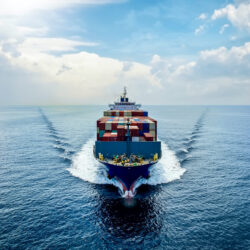A Plan B is more important than ever in shipping

Shipping is facing increasing volatility and uncertainties due to war, geopolitical events, climate change, and piracy. Maritime experts from Allianz Commercial looked at some of the key implications for the annual Safety and Shipping Review, including the prospect of more cyber and drone attacks, the threat that the rise of the ‘shadow fleet’ poses to ships and the environment, as well as the various consequences of diversions. ‘In today’s environment where everything is interconnected, it is even more important to have a Plan B.’
Recent incidents in the wake of the Gaza conflict have highlighted the increasing vulnerability of global shipping to wars and disputes. Allianz reported more than 50 attacks on merchant ships in the Red Sea by Houthi militants between 19 November 2023 and early April 2024 in response to the conflict.
That disruption to shipping has also lasted longer than expected and is likely to continue for the foreseeable future, said Captain Rahul Khanna, Global Head of Marine Risk Consulting at Allianz. ‘Although we have seen sporadic attacks in the past, the conflict in Gaza has opened the floodgates. Even if a political solution is reached, the attacks may continue because those seeking to disrupt shipping in the Red Sea and beyond now see a clear opportunity.’
Increasing threat from drones
The war in Ukraine and attacks in the Red Sea have also highlighted the growing threat of drones to commercial shipping, including by Houthi militants in the Red Sea and neighbouring Gulf of Aden. ‘Recent events show how even smaller groups can disrupt shipping by using drones or explosives to attack critical trade routes,’ said Captain Nitin Chopra, Senior Marine Risk Consultant at Allianz.
More technology-driven attacks against shipping and ports are a possibility that should be seriously considered. According to Allianz, there are increasing reports of ships suffering from GPS interference and jamming, which can result in lost or inaccurate signals affecting navigation, especially in hotspots such as the Strait of Hormuz, the Mediterranean, and the Black Sea. Ships with automatic identification systems (AIS) can also be spoofed and are susceptible to cyber-attacks.
Challenges due to diversions
Attacks on shipping in the Red Sea and Middle Eastern waters, combined with the ongoing disruption caused by drought in the Panama Canal, have significantly increased the distance ships have to travel. Both routes are crucial for transport between Asia, Europe, and the US East Coast. Avoiding the Suez Canal, for example, adds at least 3,000 nautical miles and 10 days of sailing time to each voyage if bypassing via the Cape of Good Hope.
Companies sourcing goods and parts from factories in China and Southeast Asia have faced delays and higher costs due to longer transit times. Some companies reported logistics delays that increased delivery times by three to four weeks, creating cash flow problems and shortages of parts on production lines. There were also increases of 300% for container rental.
Disruption in the Red Sea may also erode the environmental gains achieved through slow steaming as diverted ships increase their speed to cover longer distances. The longer distances caused by diverting container ships from the Suez Canal to the Cape of Good Hope lead to an estimated 70% increase in greenhouse gas emissions for a round trip from Singapore to northern Europe.
New piracy threat
Piracy also increased again last year. There were 120 reported incidents against ships in 2023, up from 2022. A major concern is the re-emergence of pirates off the Horn of Africa amid broader security concerns in the neighbouring Red Sea. ‘We must be prepared for the prospect of seeing a period of renewed hijackings and piracy attacks at sea,’ warned Khanna.
Shadow fleet of tankers
A gradual tightening of international sanctions against Russian oil and gas exports over the past three years has led to the emergence of a sizeable ‘shadow fleet’ of tankers, mostly older vessels operating outside international regulations and often without proper insurance, according to Allianz. This situation poses serious environmental and safety risks at key bottlenecks where oil is shipped.
And Russia is not the only country operating a shadow fleet. Iran and Venezuela have used these tankers to circumvent sanctions and maintain oil exports. The size of the dark fleet is estimated at 600 to 1,400 ships, roughly a fifth of the total global crude oil tanker fleet. Ships have been involved in at least 50 incidents so far, including fires, engine failures, collisions, loss of steering, and oil spills.
Territorial disputes
The Red Sea crisis shows how important waterways like the Suez Canal are to the global economy and how vulnerable they can be to disruptions. It has also drawn attention to other parts of the globe where shipping lanes are exposed to geopolitical events, such as in the South China Sea. ‘Political rivalries and conflicts are increasingly taking place at sea,’ said Nitin Chopra. ‘Shipping companies must always be prepared for potential sources of disruption to their operations and supply chains.’
Rahul Khanna believes it is even more important to have a Plan B in today’s environment where everything is interconnected. ‘An unexpected event can have a domino effect globally. Shippers around the world need to consider diversifying their supply chains, and in some cases, nearshoring and onshoring may be an option.’ In addition, more transparency is also part of the solution, especially when it comes to cargo tracking, according to Allianz.









